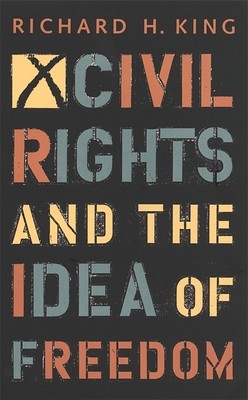
- We will send in 10–14 business days.
- Author: Richard King
- Publisher: University of Georgia Press
- ISBN-10: 0820318248
- ISBN-13: 9780820318240
- Format: 14.2 x 21.6 x 2.1 cm, minkšti viršeliai
- Language: English
- SAVE -10% with code: EXTRA
Reviews
Description
Civil Rights and the Idea of Freedom is a groundbreaking work, one of the first to show in detail how the civil rights movement crystallized our views of citizenship as a grassroots-level, collective endeavor and of self-respect as a formidable political tool. Drawing on both oral and written sources, Richard H. King shows how rank-and-file movement participants defined and discussed such concepts as rights, equality, justice, and, in particular, freedom, and how such key movement leaders as Martin Luther King Jr., Ella Baker, Stokely Carmichael, and James Forman were attuned to this "freedom talk."
The book includes chapters on the concept of freedom in its many varieties, both individual and collective; on self-interest and self-respect; on Martin Luther King's use of the idea of freedom; and on the intellectual evolution of the Student Non-violent Coordinating Committee, especially in light of Frantz Fanon's thought among movement radicals. In demonstrating that self-respect, self-determination, and solidarity were as central to the goals of the movement as the dismantling of the Jim Crow system, King argues that the movement's success should not be measured in terms of tangible, quantifiable advances alone, such as voter registration increases or improved standards of living. Not only has the civil rights movement helped strengthen the meaning and political importance of active citizenship in the contemporary world, says King, butEXTRA 10 % discount with code: EXTRA
The promotion ends in 22d.12:35:34
The discount code is valid when purchasing from 10 €. Discounts do not stack.
- Author: Richard King
- Publisher: University of Georgia Press
- ISBN-10: 0820318248
- ISBN-13: 9780820318240
- Format: 14.2 x 21.6 x 2.1 cm, minkšti viršeliai
- Language: English English
Civil Rights and the Idea of Freedom is a groundbreaking work, one of the first to show in detail how the civil rights movement crystallized our views of citizenship as a grassroots-level, collective endeavor and of self-respect as a formidable political tool. Drawing on both oral and written sources, Richard H. King shows how rank-and-file movement participants defined and discussed such concepts as rights, equality, justice, and, in particular, freedom, and how such key movement leaders as Martin Luther King Jr., Ella Baker, Stokely Carmichael, and James Forman were attuned to this "freedom talk."
The book includes chapters on the concept of freedom in its many varieties, both individual and collective; on self-interest and self-respect; on Martin Luther King's use of the idea of freedom; and on the intellectual evolution of the Student Non-violent Coordinating Committee, especially in light of Frantz Fanon's thought among movement radicals. In demonstrating that self-respect, self-determination, and solidarity were as central to the goals of the movement as the dismantling of the Jim Crow system, King argues that the movement's success should not be measured in terms of tangible, quantifiable advances alone, such as voter registration increases or improved standards of living. Not only has the civil rights movement helped strengthen the meaning and political importance of active citizenship in the contemporary world, says King, but

Reviews